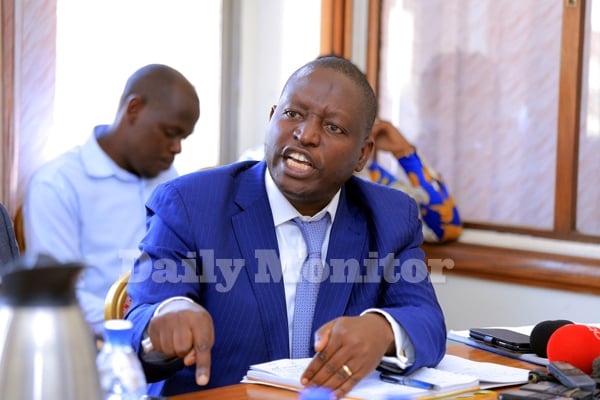Shs44t budget passed

State Minister for Trade , Industry and Cooperatives, Mr David Bahati. PHOTO/DAVID LUBOWA
What you need to know:
- Mr Fredrick Angura (Tororo South) said government should always first compensate people to create way for construction of huge projects before looking for developers.
- Government plans to get Shs11.4 trillion from domestic borrowing and Shs9 trillion from external borrowing.
Parliament has approved a Shs44.7 trillion budget for the approaching financial year 2021/2022, following one month’s debate on ammendments by the parliamentary committee.
The new budget is down from this financial year’s Shs45.6 trillion, with a difference of Shs900 billion.
The Budget was approved on Friday evening after presentation of the Budget committee report by the chairman, Mr Amos Lugoloobi.
“The Committee has established that there is a notable decrease in the resource envelope by Shs879.4 billion in comparison to the resource envelope as per the approved NBFP of FY2021 /22. This reduction is largely attributed to a projected decrease in external borrowing by Shs1.3trillion,” he said.
In the approved budget, Shs28.8 trillion is available for spending while Shs15.9trillion will finance the country’s distressing debt and accumulated interest.
The country’s public debt (Domestic and External) has accumulated to Shs65 trillion as of December 2020, according to government. This is an increase from Shs49 trillion in 2019.
In the new budget that takes effect on July 1, Agro-industrialization comes in the third position with Shs1.6 trillion followed by Regional Development with Shs1.2 trillion.
Other programmes include sustainable Energy Development (Shs1.1 trillion), Development Plan Implementation (Shs1.1 trillion), Legislature (Shs831b) and Judiciary, (Shs370b), among others.
On the debt component, Shs8.5 trillion has been allocated for domestic refinancing and Shs5 trillion for interest repayment.
Government has also allocated Shs6.8 trillion for Interest payment and External Debt Repayments (Amortisation).
A total of Shs400b has been allocated to domestic arrears. Commenting on the budget, however, the State minister for Finance in charge of Planning, Mr David Bahati, assured Parliament that Uganda’s debt is sustainable and that the money borrowed is being invested in projects that will grow the economy.
“The increase in debt is on account of increased borrowing to address the socio-economic impact of Covid-19 to mitigate the negative effects of the pandemic,” he said, projecting that the debt is expected to rise to 51.9 per cent to Gross Domestic Product (GDP) in the next financial year.
He said the debt will surpass the threshold of 50 per cent in the next financial year.
“But it is projected to decline thereafter on account of increased domestic revenue,” he stressed.
Mr Lugoloobi said Shs200b will be drawn from the Petroleum Fund to specifically finance oil road infrastructure during the FY 2021 /22.
Domestic and External Financing will constitute 76.7per cent and 23.3per cent of the total resource envelope, respectively. Out of the Shs44.7 trillion budget, Shs22.6trillion will be realised from the domestic revenue, out of which Shs20.8 trillion will come from taxes projected to be collected by the Uganda Revenue Authority (URA).
Parliament this month approved about seven new taxes, with a 12 per cent tax on data to replace over-the-top (OTT) tax, 25 per cent or Shs250 tax on locally made alcohol, Shs70, 000 on fish maw, and 30 per cent tax on all rental income, among others, as part of the revenue for the FY2021/2022 Budget.
Government plans to get Shs11.4 trillion from domestic borrowing and Shs9 trillion from external borrowing.
Mr Lugoloobi said using resource allocations to proxy prioritisation is evident that the governance and security, human capital, development and Integrated Transport Infrastructure and services programmes are prioritised as per the proposed annual budget estimates for the FY2021/2022.
He noted that the third National Development plan (NDP III) prioritises governance and security, Human Capital Development and regional development.
Mr Lugoloobi said inconsistencies in the share of the budget allocations in regards to productive sectors such as Mineral Development, Manufacturing, and Tourism programmes that are proposed to receive a meager 0.2 per cent, 0.2 per cent and 0.6per cent respectively; yet the NDP III proposes 1.4 per cent, 1.3 per cent and 1.7 per cent share of the Budget respectively.
Recommendations
Committee members recommended that in order to reduce the pace of debt accumulation, especially in relation to budget support, the government should halt creation of administrative units and expedite the merger of institutions to eliminate duplications and wasteful expenditure, thereby reducing the need to borrow for budget support.
“Borrowing should be limited to development projects that have undergone proper project appraisals to ascertain that the projects have good economic rates of return, so that budget support borrowing is limited to exclusive periods of economic shocks where countercyclical fiscal policy is required to boost economic recoveries,” Mr Lugoloobi advised.
Mr Fredrick Angura (Tororo South) said government should always first compensate people to create way for construction of huge projects before looking for developers. He said compensation is dragging construction thus attracting huge interest in loans.




